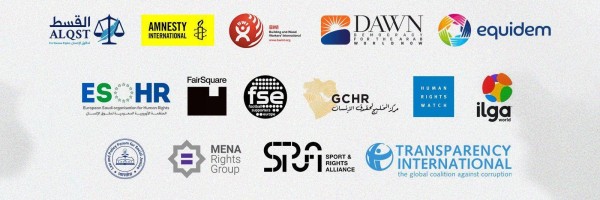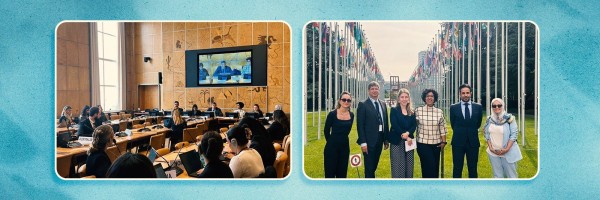Saudi Arabia’s mixed and often self-contradictory response to its fourth Universal Periodic Review (UPR), the outcome of which has now been adopted, casts doubt on the sincerity of its stated intention to improve its dismal human rights record. The Saudi authorities accepted a high proportion of UN member states’ recommendations, including some significant measures, but merely “noted” or formally rejected many other vital ones. In light of this, the undersigned NGOs highlight the need for the Saudi authorities to grant independent human rights observers access to the country to follow up on implementation of the recommendations and monitor the human rights situation on the ground.
The UPR is a peer review mechanism by which UN member states make recommendations to the country under review on how to improve its human rights record in light of the country’s international obligations. In January 2024, during its fourth UPR, Saudi Arabia received 354 recommendations from 135 states on a wide range of issues. On 4 July 2024, Saudi Arabia informed the UN Human Rights Council (HRC) of its responses.
Saudi Arabia accepted 83% of the recommendations made, some of them significant, such as calls to ratify the International Convention for the Protection of All Persons from Enforced Disappearance (ICPPED). Accepting recommendations, however, will not in itself bring about change, as they must also be acted upon promptly and effectively, which the Saudi authorities did not do after the kingdom’s third-cycle UPR in 2018. The international community will therefore want to closely monitor the authorities’ actual response on the ground.
Crucial recommendations that were formally rejected included calls to release detained human rights defenders (HRDs), repeal the travel bans imposed on them, and refrain from taking reprisals against them. These decisions should be reversed immediately.
Meanwhile, other recommendations were merely “noted”, sometimes in apparent contradiction of those endorsed. These included calls for the ratification of international human rights mechanisms, amendment of domestic laws, and cooperation with the United Nations.
National human rights institution (NHRI)
Saudi Arabia accepted all of the three recommendations (43.72-43.74) for its national human rights institution, the Saudi Human Rights Commission (SHRC), to be brought into compliance with the Paris Principles, a set of international standards for such bodies, the key pillars of which are pluralism, independence and effectiveness. The SHRC is currently far from independent and effective, and has acted with dishonesty towards many victims of abuse, as highlighted in a report by MENA Rights Group, ALQST for Human Rights and the European Saudi Organisation for Human Rights (ESOHR). Moreover, the very fact that the SHRC’s President, Hala al-Tuwaijri, led the Saudi delegation during the UPR adoption session clearly shows it continuing to violate the principle that NHRIs should be independent of their national governments.
Country access and cooperation with the United Nations
UN fact-finding experts have been denied access to Saudi Arabia for years, which reflects a wider lack of accountability that undermines many fundamental human rights. The Saudi authorities accepted several recommendations to enhance cooperation with the United Nations, such as to “grant unhindered access to the United Nations special procedures” (43.68). Yet at the same time, and while running for a seat at the HRC, the Saudi delegations merely noted similar calls, including one (43.60) to "extend a standing invitation to the special procedure mandate holders of the Human Rights Council”, who have repeatedly expressed concern over the imprisonment of HRDs in Saudi Arabia, among other human rights issues.
International human rights instruments
Saudi Arabia accepted several recommendations pertaining to the ratification of international human rights treaties, including the International Convention for the Protection of All Persons from Enforced Disappearance (ICPPED) (43.27), which it had rejected during its last UPR. The authorities must now ratify the treaty and end their systematic practice of enforced disappearance, notable victims of which include HRDs Mohammed al-Qahtani and Essa al-Nukheifi, and humanitarian worker Abdulrahman al-Sadhan.
The authorities, however, merely noted recommendations to ratify other key international mechanisms, including the International Covenant on Civil and Political Rights (ICCPR) (with its two optional protocols) and the International Covenant on Economic, Social and Cultural Rights (ICESCR), and even rejected some recommendations to “consider” ratifying them (43.5-43.9).
Domestic legal framework and the judiciary
Several states had called for revisions to the repressive Law on Combating Crimes of Terrorism and its Financing (Counter-Terrorism Law) and Anti-Cybercrime Law, which have been routinely weaponised to crack down on peaceful dissent. Saudi Arabia accepted two such recommendations (43.120, 43.123), while merely noting others (43.119, 43.122) and caveating its support by noting that the country’s “laws are subject to regular and continuous review”. This inevitably casts doubt on the genuineness of the authorities’ intention to make substantive reforms.
Saudi Arabia did accept a recommendation to reform the kingdom’s criminal courts (43.137), which are notorious for their failure to respect due process and their lack of independence. However, it only noted the significant recommendation (43.112) to “restrict the use of the Specialized Criminal Court to cases that are appropriately defined as terrorism and permit journalists and diplomats to routinely monitor such trials”, access that has been denied since October 2018.
Freedom of expression, assembly and association
In light of the Saudi authorities’ sustained targeting of HRDs and other independent civil society actors for peacefully exercising their basic rights, many states had issued recommendations regarding protection of the rights to freedom of expression, peaceful assembly and association. Saudi Arabia accepted some general recommendations to ensure the right to freedom of expression (43.143-43.144) and to ensure a safe environment for HRDs, WHRDs, journalists (43.118, 43.152, 43.154) and civil society (43.77), yet only noted parts of recommendations that related to the freedom of peaceful assembly (43.124, 43.135), remarking that “this goes beyond the Kingdom's commitments”.
Worryingly, Saudi Arabia formally rejected other crucial recommendations pertaining to HRDs. For instance, it rejected Belgium’s recommendation to “refrain from reprisals against human rights defenders for interactions with United Nations human rights mechanisms” (43.65). It claimed that this was based on “unfounded allegations”, despite a wide range of civil society reports documenting reprisals being carried out by the Saudi authorities. For example, HRD Essa al-Nukheifi, who was consulted during preparations for the Special Rapporteur on extreme poverty’s visit to Saudi Arabia in January 2017, was subsequently given a six-year prison sentence on charges relating to his human rights work.
The Saudi authorities likewise rejected Luxembourg’s recommendation to “release all demonstrators, human rights defenders and journalists detained for exercising their freedom of expression” (43.116), again citing “unfounded allegations”. Yet countless individuals have been
detained by Saudi Arabia’s authorities in recent years after peacefully exercising their basic rights, many of whom are still held in detention without charge, facing prolonged trial, or serving lengthy prison sentences.
The Saudi delegation also flatly rejected the Netherlands’ recommendation to “repeal travel bans for human rights defenders who have completed their prison sentences” (43.117), again claiming it was based on “unfounded allegations”. However, many prisoners of conscience who have been conditionally released in recent years continue to face lengthy travel bans, whether ordered by the courts or imposed unofficially. Women’s rights activist Loujain al-Hathloul, for example, remains under an arbitrary travel ban despite her official travel ban having expired in November 2023.
Torture and ill-treatment
Saudi Arabia accepted several recommendations in relation to torture and ill-treatment, which remain pervasive practices in Saudi Arabia, both to extract confessions during interrogation and as a form of punishment during detention. It accepted calls to investigate allegations of torture (43.115) and to include the crime of torture, which is currently not explicitly defined, in the country’s penal provisions (43.114). However, the authorities only noted the recommendation to ratify the Optional Protocol to the Convention against Torture and Other Cruel, Inhuman or Degrading Treatment or Punishment (CAT) (43.23), accepting only the vague recommendation to “consider” ratifying it (43.26).
The death penalty
Many states had called for the abolition of the death penalty for minors, which Saudi Arabia’s authorities partially accepted, but only on the false basis that they consider it partially implemented “due to the issuance of the Juveniles Law”. In reality, the 2018 Juveniles Law, as well as a follow-up Royal Decree in 2020 that has yet to be published, leaves open significant loopholes that allow child defendants to be sentenced to death. The SHRC has insisted that “no one in Saudi Arabia will be executed for a crime committed as a minor”, but this has been exposed as an empty pledge; several child defendants remain at imminent risk of execution. If these claims are at all serious, their death sentences must be quashed immediately.
Saudi Arabia only noted most other recommendations relating to the death penalty, including calls to establish a moratorium, and for drug-related crimes specifically. Despite a 2018 pledge from Crown Prince Mohammed bin Salman to reduce use of the death penalty, the rate of executions has continued to rise, and in 2023 at least 172 individuals were executed, the third highest known figure globally. Saudi Arabia supported only one recommendation on the issue, namely to “abolish the death penalty or at the very least limit it to the most serious crimes while applying a narrow definition of terrorism and abolishing it for all juvenile offenders” (43.109). This is a recommendation of major significance that civil society will closely monitor to ensure its implementation.
Women’s rights
Saudi Arabia accepted a number of recommendations pertaining to the promotion of women’s rights and gender equality, including calls to abolish the male guardianship system (43.164, 43.273-43.275) and “repeal all provisions in the Personal Status Act that discriminate against women and girls, including in marriage, divorce and custody” (43.162). Despite claims made by the Saudi authorities, the repressive male guardianship system has not yet been fully dismantled, and much of it has instead been embedded in the Personal Status Law.
The Saudi delegation only noted a recommendation (43.161) to amend the discriminatory provision regarding transfer of nationality in the kingdom’s citizenship law, and another (43.41) to “withdraw all reservations to the Convention on the Elimination of All Forms of Discrimination against Women”. This is completely incongruous with Saudi Arabia’s recent election as chair of the main UN forum for promoting gender equality and the empowerment of women, the Commission on the Status of Women.
Migrant rights
Saudi Arabia accepted several general calls to strengthen the rights of migrant workers (43.34-43.35, 43.50), as well as to ratify the International Convention on the Protection of the Rights of All Migrant Workers and Members of Their Families (43.29).
However, it merely noted specific calls to close loopholes in recent reforms to the Labour Law, such as by including domestic workers within its provisions (43.201) and establishing a minimum wage for all migrant workers (43.184). It only partially accepted a call for transparent investigations into the mass killings by Saudi forces of migrants and asylum seekers crossing the Yemen-Saudi border in 2022-23 (43.347). It said it considered the matter of investigations and accountability to be “done”, but rejected a call to publish the findings, saying there was “no justification for such action or a legal international obligation requiring the KSA to share its internal investigations”. This lack of transparency is alarming.
Conclusion
The undersigned organisations view this UPR as a litmus test of how genuine the Saudi authorities are about wanting to improve the dire human rights situation in the country. Their mixed and often self-contradictory response, which allows them to boast of a high acceptance rate overall while rejecting some of the most important recommendations made, casts doubt on their seriousness about reform, especially given their failure to implement many of the recommendations they accepted in Saudi Arabia’s previous UPR.
It is therefore vital for the international community to closely follow up on this latest UPR, to ensure that significant recommendations that have been formally accepted are now implemented, and that decisions to reject others are reversed. Moreover, given the total lack of transparency in the country, which is an underlying impediment to basic rights guarantees, we urge the Saudi authorities to grant independent international observers and NGOs access, and that they extend invitations to, and accept visits from, UN special procedures mandate holders.
Signatories:
1. ALQST for Human Rights
2. European Saudi Organisation for Human Rights (ESOHR)
3. Gulf Centre for Human Rights (GCHR)
4. International Federation for Human Rights (FIDH)
5. International Service for Human Rights (ISHR)
6. MENA Rights Group
7. Together Against the Death Penalty (Ensemble Contre la Peine De Mort – ECPM)




